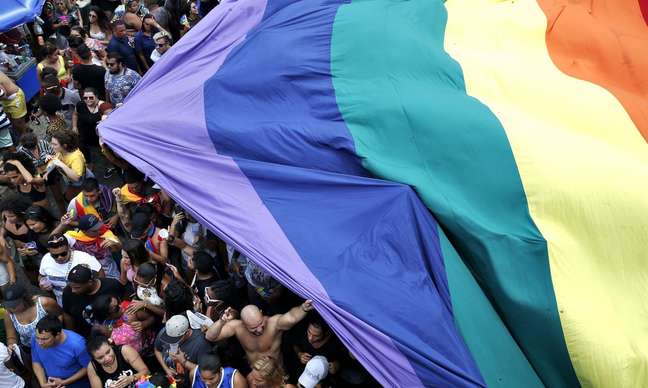The study was supported by the Ministry of Women

A trans person’s path to establishing himself as a professional is criss-crossed by school-to-work transphobia, reveals a survey released this week in Rio de Janeiro by Grupo Pela Vidda, which interviewed transgender men and women.
With friends, teachers and family members being the main attackers during training, and basic rights such as the use of a proper toilet often not respected in the workplace, half of respondents reported living with depression and 60% said they have already thought about suicide.
The survey was carried out by the TransVida project, of Grupo pela Vidda, with the support of the Ministry of Women, Family and Human Rights, and conducted by anthropologist and activist Fabrício Longo. The final report warns that transphobia reduces trans people’s chances of access and survival, and TransVida coordinator Maria Eduarda Aguiar argues that this form of prejudice prevents a part of the Brazilian population from developing their workforce and talents professional.
“We have a large number of people in our country who are prevented from producing and working. And it’s not because they’re not capable. It’s because of discrimination,” he said.
Prejudice
The research report highlighted that, in addition to fighting prejudice, it is necessary to educate employers on the need to hire these people and, in the case of HR professionals, on the particularities of this population that must be considered in the hiring process and after hospitalization.
“You also need to ensure that other company employees understand these vulnerabilities and create a healthy environment for their daily work,” the text states.
The study involved an online questionnaire and face-to-face interviews were also conducted. To reach the vulnerable population, the research team visited shelters for the trans population, such as CasaNem and Luana Muniz’s Casarão Sementes, as well as promoting name and gender rectification efforts and inviting participants to respond to the survey. . In all, 147 responses were collected, most of whom were trans women (42.9%), black (31.3%) and aged 19-29 (55.1%).
Only 15% of survey participants reported having a formal job, while 15.6% are formally self-employed and 27.2% are informally self-employed. Considered in many cases the last resort for the survival of the trans population, prostitution was the paid activity of 14.3% of those interviewed.
Education
The questionnaire allowed the interviewees to mark all the violence and discrimination suffered during the training, and only one out of four declared that they had never suffered discrimination, while 36.7% declared that they had been a victim of transphobia; 34% homophobic; and 10.9% racism.
The most common forms of violence were failure to respect the company name (27.9%), psychological torture (21.1%) and the prohibition of using a gender-appropriate bathroom (20.4%). Physical violence was reported by 15.6% of respondents and 16.3% experienced sexual harassment or rape.
Those responsible for these attacks during the training period were mainly close people: friends or acquaintances (38.4%); teachers, coordinators and school leaders (32.9%); fathers, mothers and brothers (30.8%); and other family members (23.3%).
While 15% decided to report these attacks to the school or the authorities, 29.9% preferred not to say anything and 10.2% dropped out of school after episodes of violence.
“The issue of family violence is still a big problem. Investing in shelters would be an immediate strategy. And invest in the fight against transphobia in schools. It is something that our country has not addressed. I cannot allow a trans person to study in a school where she cannot go to the toilet,” said Maria Eduarda.
According to the survey, 49% of respondents managed to complete high school, but less than half of this contingent (21.1%) went on to earn a college degree.
The TransVida program coordinator pointed out that this number is concerning when compared to the response of the companies surveyed, since 96.2% require a higher education to be hired.
“What is very clear is that transphobia early in life, in the school environment itself, often ends up preventing these people from finishing their studies. So, you have a large number of trans people who failed to complete high school.”
Work
The questions addressed to the labor market show a little the difficulties of trans people in their professional experiences. More than half (52.7%) of respondents say they are the only transgender worker in their company and 25.9% say there are between two and ten trans people among their employees.
Nearly half of employed transgender people (48%) got the job at the referral of friends or acquaintances. Maria Eduarda Aguiar added that many cases involve people referred by non-governmental organizations or reservations of specific vacancies for transgender people. While this picture reinforces the importance of these initiatives, it also shows the difficulty these people have in finding a job on their own.
“We still have the problem of the trans person who can’t apply for a vacancy without needing a specific vacancy for them,” she says. “We understand that companies must invest in awareness, because it is useless for them to enter and suffer transphobia,” she explained.
The questionnaire asked the interviewees to mark all the forms of discrimination or violence suffered or witnessed at work and 27.6% reported their transphobia; 14.2%, racism; and 9%, homophobia. Failure to comply with the company name has been reported by 16.4% of these workers and 6% have already been prevented from using the correct toilet.
Mental health
Many difficulties and aggressions in the course of life damage not only the integration of the trans population into the labor market, but also their mental health, highlighted Maria Eduarda. Interviews show that three out of four participants needed professional psychological support and 60.5% already had suicidal thoughts.
“Violence and mental health problems cause people to have a worse quality of life and also low self-esteem, without a sense of the future, living today without knowing if there will be a tomorrow,” said Maria Eduarda.
In addition to statistical data on the respondents, the researchers also collected testimonials from the participants’ experiences. One of them is Pablo Henrique Sant, a 28-year-old trans man, who said he has already faced situations of psychological violence in the workplace.
“I worked at a hospital care company that required the use of a name badge, I had to make another badge with my company name and I had to hide because if they took it they said I had to use the name record,” he said. said, who often found barriers already in the selection. “When I got to the last part of the process — I roughly remember at least four companies here — they said they didn’t know how to deal with it, that it wasn’t bias, but that it was going to be a problem,” he recalled.
The transvestite Wescla Vasconcelos, who holds a master’s degree in culture and territoriality from the Fluminense Federal University, said she discovered she was trans very early, at the age of 11, and that she faced many situations that hurt her during the his training.
“They always doubt that we are capable of building a career, of building a future, a profession. So, in public school I had to face a lot of discrimination, a lot, both in terms of company name, use of the bathroom, name-phone calls, physical violence and verbal, I was unable to find any professional placement that really valued me, all the internship and course opportunities, some informal jobs that I had in pedagogy, have been crossed by a lot of discrimination”, he concluded.
+The best content in your email for free. Choose your favorite Terra newsletter. Click here!
Source: Terra
Camila Luna is a writer at Gossipify, where she covers the latest movies and television series. With a passion for all things entertainment, Camila brings her unique perspective to her writing and offers readers an inside look at the industry. Camila is a graduate from the University of California, Los Angeles (UCLA) with a degree in English and is also a avid movie watcher.





